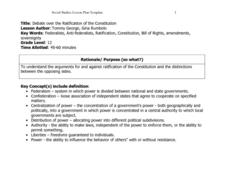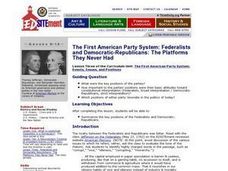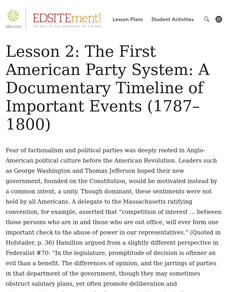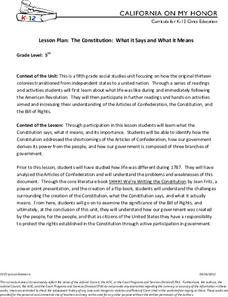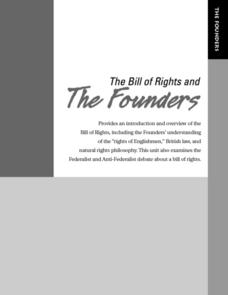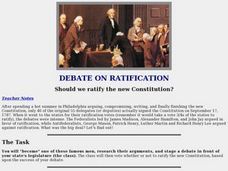Law Focused Education
Federalist — Anti-Federalist
Deciding how to rule a nation is no easy task. Scholars use an online quiz to test their knowledge of Federalist and Anti-Federalist positions, ideas on the Articles of Confederation, and finish with questions on the United States...
North Carolina Consortium for Middle East Studies
Federalists v. Anti‐Federalists
Here is a solid lesson plan to support your instruction on the Continental Congress and the Articles of Confederation. It includes close analysis of primary source images, a guided notes template and answer key, and many key points to...
Curated OER
Debate over the Ratification of the Constitution
Twelfth graders discuss the creation of the United States, the Articles of Confederation and the Constitution. Through a class debate, role-playing Federalists and Anti-federalists, they identify the reasons for and against ratification...
iCivics
You've Got Rights!
If aliens invaders nearly destroy the world in the distant future and leaders must decide on a pamphlet of protections to preserve individual rights, what should they include? Introduce the Bill of Rights and the struggle between the...
Curated OER
The First American Party System: Federalists and Democratic-Republicans: The Platforms They Never Had
Students investigate the beginnings of the political party system in the US. They determine the key positions of both the Federalists and the Democratic-Republicans. They compare the views of the early political parties with those of today.
Curated OER
The Federalist Debates: Balancing Power Between State and Federal Governments
Middle schoolers explain the basic positions of the Federalists and the Anti-Federalists. They chart the differences and similarities between state and federal governments. They write a persuasive essay in response to an open-ended...
Curated OER
Why a Bill of Rights? What Impact Does it Have?
Students explore the Bill of Rights. In this Bill of Rights activity, students compare the Federalist view of government to the Anti-Federalist view of government. Students consider the impact of the bill of rights as they take notes on...
Curated OER
We the People Lesson 2
Students compare the Federalists and Anti-Federalists visions for the U.S. government. For this government lesson, students conduct research on Federalists and Anti-Federalists figures. Students use their findings to help them write...
Curated OER
The Federalist Debates: Balancing Power Between State and Federal Governments
Students examine the pros and cons of state sovereignty vs. federalism, as argued by the Founding Fathers. They identify the basic positions of each side, complete a worksheet, and write a persuasive essay arguing for Jefferson or Hamilton.
Curated OER
The First American Party System: A Documentary Timeline of Important Events (1787-1800)
Students conduct research on the events of the end of the 18th century in order to identify critical factors leading to the development of the Federalist and Democratic-Republican political parties. They summarize the key positions of...
Judicial Branch of California
The Constitution: What It Says and What It Means
Learners get the chance to act as representatives to the Constitution Convention, and must decide whether or not to recommend your state ratify the new framework. After examining the Constitution line-by-line, they consider their...
Curated OER
Lesson Plan: Early Political Parties
Pupils examine the platforms of early political parties in the United States. For this political parties lesson, students discover details regarding the attributes and ideals of the federalists and the democratic-republicans. Pupils...
Curated OER
The Bill of Rights and the Founders
Students explain similarities between historical statements of rights and their modern applications, explore ideas of "Rights of Englishmen" and natural rights, discuss evolution of concept of rights and its impact on Bill of Rights,...
National Endowment for the Humanities
Background on the Patriot Attitude toward the Monarch
Learners explain the Patriot attitude toward the British monarchy, which helps them embrace the Founders' reluctance to have a strong executive under the Articles of Confederation as well as their desire to build in checks of executive...
Curated OER
Federalist and Antifederalist Papers
Young scholars debate the Federalist and Anti-federal Papers after using the Internet as a research tool.
Curated OER
Debate On Ratification
Students simulate a delegate that was responsible for the Constitution. They research their arguments, and stage a debate in front of the state's legislature (the class). The class then vote whether or not to ratify the new Constitution.
Curated OER
Lesson on Federalism
Eleventh graders study Federalism and delegated, reserved, and concurrent powers. They participate in a simulation in which they role-play Federalists and Anti-federalists debating which powers should be categorized as delegated,...
Curated OER
Federalism
Students become familiar with the Federalist papers and the work of the federal government. In this federalism lesson, students find similarities and differences between state and federal government.
Curated OER
Constitutional Convention
Students engage in a role-playing situation to illustrate the kinds of compromised that were made a teh Constitutional Convention. They write three short 1-2 paragraph arguments and then present their arguments to the class at the...




